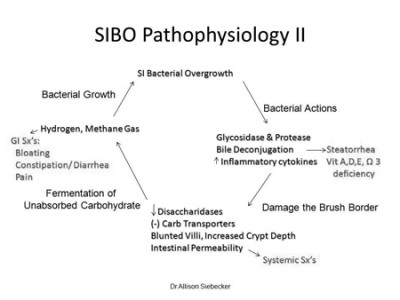

These guidelines recommend prokinetics for symptomatic motility issues and rotating antibiotics for malabsorption due to SIBO.

The most recent EULAR recommendations for the treatment of GI manifestations of SSc are from 2016. Continuing proton pump inhibitors (PPIs) prior to testing is not felt to alter results, but the literature is conflicting. The use of prokinetics can lead to a false-positive due to faster transit time and should be held 1 week prior to testing. The Consensus Group recommended that antibiotics be held 4 weeks prior to initial testing as they can affect hydrogen and methane production, although to an unknown extent. These gases enter the circulatory system and are expired via the lungs where the change in gases is measured pre- and post-ingestion. This is done by ingesting various carbohydrate substrates such as glucose (sensitivity 20–93%, specificity 30–86%) or lactulose (sensitivity 31–68%, specificity 44–100%), which are then broken down by intestinal microbes, producing gases like hydrogen and methane. Therefore, diagnosis of SIBO is primary made using breath testing as it is non-invasive and relatively inexpensive. These scales are mostly used for research purposes and screening for SIBO is mainly based on clinical assessment of symptoms.įor diagnosis of SIBO, a North American Consensus Group found that aspiration of small bowel fluid for culture and bacterial count has been considered the gold standard but is flawed by false-positives due to contamination with oral and oesophageal flora and false-negatives due to lack of ability to reach the mid and distal section of the small bowel. Another validated scale that is not specific to SSc is the Gastrointestinal Quality of Life Index, which can be used to assess symptoms over time.
SMALL BOWEL BACTERIAL OVERGROWTH TREATMENT TRIAL
They also experienced significant weight loss within 6 months and scored higher on the University of California Los Angeles Scleroderma Clinical Trial Consortium Gastrointestinal Tract Instrument 2.0, which is a validated scale to assess self-reported GI quality of life. In one study of 37 SSc patients, patients affected by SIBO had a longer duration of disease than those who were unaffected with a median of 11 vs 7 years, respectively ( P = 0.02). Left untreated, SIBO can eventually lead to malnutrition due to malabsorption. It presents with symptoms of abdominal pain or discomfort, bloating, diarrhoea, constipation and abdominal tenderness. Indeed, SIBO is a common manifestation in SSc with a prevalence of 30–62%. The resulting delayed gastric emptying and prolonged orocaecal transit time creates an environment conducive to small intestinal bacterial overgrowth (SIBO). This occurs in concert with fibro-proliferative vasculopathy and GI nerve impairment via autoantibodies against muscarinic (M3) acetylcholine receptors that promote smooth muscle contraction. In SSc, the GI musculature can become progressively fibrosed with types I and II collagen depositing into the muscularis mucosa and lamina propria, leading to reduced contractility. Both upper and lower GI tracts can be affected, which may have significant negative effects on quality of life. GI manifestations have been reported in up to 98% of patients with SSc. In turn, this leads to the production of autoantibodies and cell-mediated autoimmunity, small vessel fibro-proliferative vasculopathy and dysfunction of fibroblasts, which subsequently leads to excessive collagen and accumulation of other matrix components. The manifestations of this disease are likely secondary to abnormalities of the innate and adaptive immune systems. SSc is an autoimmune disease that causes fibrosis of multiple organ systems including the dermatologic, gastrointestinal (GI), pulmonary, renal and musculoskeletal systems. Longitudinal cohort studies are required to further study small intestinal bacterial overgrowth eradication in patients with SSc. There is insufficient evidence on effectiveness of prokinetics/probiotics at eradicating small intestinal bacterial overgrowth in SSc. rifaximin) can eradicate small intestinal bacterial overgrowth in SSc. Limited data indicate that antibiotics (e.g.


 0 kommentar(er)
0 kommentar(er)
